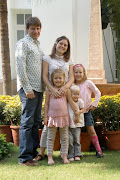Anyone can get married, provided they make the right arrangements. But what makes for a good marriage? a successful marriage? a marriage that lasts? How can we experience all that marriage is intended to be?On April 12th, I officiated at a wedding in Canada. I’ve done that a few times now and I enjoy the opportunity. I believe in marriage. The following sermon is based on some of the words that I’ve spoken at these various weddings.
Many of us know how difficult marriage can be. For those of us who are married, we have experienced the challenge. Maybe we've experienced failure in different ways. For others of us, maybe we've observed some of the challenges, or maybe even observed the breakdown of a marriage.
I’m sure that most of us would say that the key to a good marriage is love. But what kind of love? What kind of love do we wish for those who are entering married life?
I'd like to identify three aspects of the love that is required in a marriage.
1) love that gives
2) love that forgives
3) love that endures
I don't consider myself an expert in marriage or love, but after ten years of experience, I can say that I'm still excited about learning and about growing in love with my wife, Amy. By God's grace we are still enjoying marriage. But we have struggled too, and sometimes the learning has been painful. But, in the end, we're committed to experiencing all that God has intended for our marriage.
So even as I prepared this message I spent a lot of time reflecting on my own marriage, my own commitments, and my own struggles. And I want to encourage all of us to consider what this means for us, whether you're married, or intending to get married. This message is not only for the bride and groom, but it's for all of us, myself included.
1) To be happily married, you need to have a love that gives. True love is generous. It overflows. It spills over from one life to another. True love is extravagant. It seeks to give what is most valued.
If we enter marriage only for what we can get out of it, then we're entering it for the wrong reasons. We get married because we have something to give. And primarily, what we have to give is ourselves. And that's really what happens in the vows: the groom commits himself to the bride; the bride commits herself to the groom. They give themselves to one another.
Sometimes we express ourselves and our love through the giving and receiving of things, of material possessions. Sometimes, as with the rings in this ceremony, the gifts are symbolic. They symbolize something deeper, something more profound. The most we can give, the best we can offer each other, is our very selves.
When Christians talk about love, they talk about God. The Bible teaches us that God is love. There's a statement in the Bible about love that says, "We love because he first loved us..." God sets the standard. But he doesn't just set it, he meets it. He doesn't just define it for us, he gives us an example to follow. He shows us his love. He acts it out. God proves His love toward us. That's what the Cross is all about. That's what the Gospel is all about: the love that God has for us. It’s a love without conditions, a love without boundaries. It’s a love that gives.
What did God give? He gave himself. As human beings we needed help, and God sent help. But he didn't send someone else – he came himself. He came down to earth as Jesus Christ and lived among us. He gave himself for us – that's what kind of love we're talking about.
In the Gospel of John, it says that God loved us so much, that he gave. He gave us Jesus.
Love is generous. Love motivates us to give of ourselves. Unfortunately, that doesn't come naturally for us. Selfishness is something that comes naturally. One thing marriage has shown me is how selfish I am. Becoming a father has taught me how selfish I can be.
When we get marriaged, we're tempted again and again to say, "What about me? What about my needs?" Love teaches us to give without expecting something in return. Love teaches us to become servants in our own homes, looking to the needs of others.
In the Gospel of Mark, Jesus says that he "came not to be served, but to serve, and to give his life as a ransom for many." It’s a love that gives. It’s a love that looks beyond ourselves and sees the needs of others.
In marriage, we are meant to give ourselves to one another. Today, the bride and groom will give themselves to each other. The temptation, down the road, is to withdraw from each other, to hide things from each other, to hold back, to pretend, to conceal, to neglect one another. But if marriage is to succeed, each partner will need to give of themselves, to be open and honest, to be vulnerable, and to be themselves.
2) For marriage to succeed, you also need a love that forgives.
One of our most basic needs, as human beings, is forgiveness. Why? Because we mess up. It's a part of being human. And when two human beings make a covenant together and make promises to one another, there must be forgiveness built into that covenant, or else it will fail. Why? Because, even in marriage, we mess up. Somewhere along the line we fall short of those commitments, and we don't love in the way that we should.
So, what happens when we don't measure up? What happens when we break promises? Do we end it? Do we give up? No, we learn to forgive and to be forgiven. And we get back on track with our commitments.
As Christians, we again look into the heart of God to understand this aspect of love. God’s love for us is a love that forgives. The Bible teaches that God is eager to forgive. He loves it when we come to him and say, "Please forgive me." His heart overflows with mercy and grace toward us. And when we understand how much God has forgiven us, it is so much easier for us to forgive others. God wants to set us free to love one another with a love that forgives.
No marriage can ever survive without forgiveness, without both people being able to admit failure and weakness. Both parties will continue to make mistakes. They will need to ask for forgiveness. They will need to be able to say, "I'm sorry, please forgive me". And, of course, both parties will also need to accept that apology from one another and say, "I forgive you".
When we hold grudges, when we keep a record of other peoples' mistakes, it simply means that we have not forgiven. And there is nothing more destructive in any relationship than unforgiveness. When we refuse to forgive, it destroys us from the inside.
In marriage, we need a love that forgives.
3) A third component that is required in a good marriage is a love that endures.
I have three young daughters, and I’ve had the privilege of watching each one of them learn to walk. I’ve been reminded with each of them how important it is to keep trying, to be persistent. They didn’t let their mistakes drag them down. They didn’t get discouraged easily. They stumbled and fell many times, but they kept getting back up. They kept trying. They endured.
Marriage is a journey, hopefully a long journey. There will be different seasons. There will be rough parts of the road. There will be times when your love for each other will be tested. And you may be tempted to run. You may feel like giving up. You will need a love that endures. You will need a love that says, "There is always hope. There is always a reason to keep going. There is always opportunity to renew your vows to each other."
God is patient with us. The Bible says that he is "gracious and compassionate, slow to anger and abounding in love." The Bible is filled with stories about people who stumble and fall, and about how God's love endures toward them, how God's love carries them, and restores them.
Today is a beginning. It is an opportunity to look into the future. If you choose a love that endures, then your future looks good. Your love will grow. Your love will strengthen and deepen. Your love will mature. And you will experience God's blessing in your marriage.
It is my hope and prayer that the bride and the groom will experience a love that gives, a love that forgives, and a love that endures.
I'd like to close with the words of the Apostle Paul from his First Letter to the Corinthians, chapter 13. For some of us, these are familiar words, but let's all open our ears and hearts as we listen to this description of love, the kind of love that we've been talking about, the kind of love that is required in a marriage.
"Love is patient, love is kind.
It does not envy, it does not boast,
It is not proud, it is not rude,
Love does not insist on its own way,
It is not easily angered, it keeps no record of wrongs.
Love does not rejoice in wrong, but rejoices in the truth.
Love always protects, always trusts,
always hopes, always perseveres.
Love never fails".






























